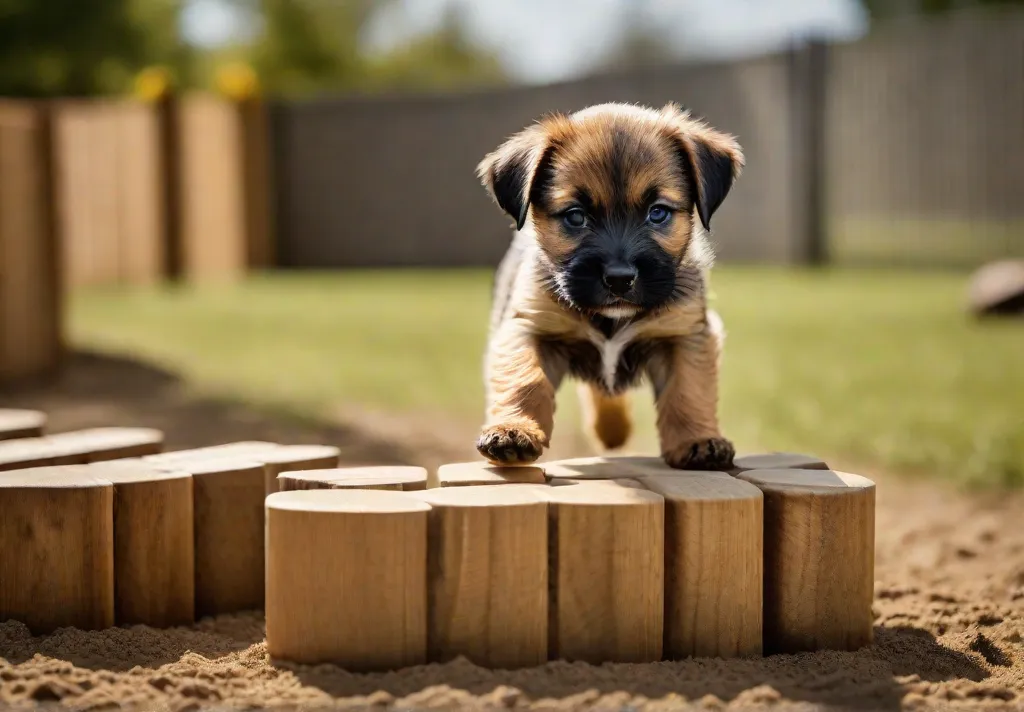Border Terrier puppies are bursting with energetic and affectionate personalities that bring immense joy to families. However, their rapid growth and developmental needs require attentive care to ensure their health and happiness. As the proud parent of a Border Terrier puppy, being proactive about their well-being lays the foundation for a long and thriving life together.
But with so much information out there, what are the most essential health practices? This article distills expert wisdom into eight fundamental tips every Border Terrier owner should know. From nutrition to dental care, this practical guide covers the key areas critical to your pup’s flourishing.
As we explore each health dimension, you’ll discover insightful statistics, actionable suggestions, and inspiring stories interwoven throughout. Consider this your handbook for navigating the exhilarating, rewarding Border Terrier puppy parenthood ride! Now, let’s dive in and uncover how to keep your lively companion healthy.
Table of Contents
Intro to Border Terrier Health
Border Terrier puppies’ boundless energy and affection can make it easy to overlook health fundamentals in all the excitement. However, their rapid development during the first year means paying attention to their physical, mental, and emotional needs is paramount.

Use this list of 8 essential tips spanning your puppy’s wellbeing as a checklist to ensure you cover all the bases. Tracking their growth and milestones with your veterinarian and providing proper nutrition, exercise, and training structure will soon become second nature as you get to know your pup.
Remaining vigilant, responsive, and loving through the foundational first year will allow your Border Terrier to thrive for many joyous years ahead.
Regular Veterinary Check-ups
Establishing a relationship with a trusted veterinarian early on plays a pivotal role in safeguarding your Border Terrier puppy’s health. From keeping vaccinations on schedule to monitoring growth patterns, check-ups provide an indispensable window into your puppy’s overall well-being.
The Importance of an Early Bond with a Veterinarian
- Allows for the early detection of potential health issues before they escalate
- Enables tailored care catered to your puppy’s changing needs
- Reduces anxiety during future vet visits through familiarity
Recommended Schedule for the First Year
- 8-12 Weeks: Initial wellness exam, first set of vaccines, deworming
- 12-16 Weeks: Second set of vaccines, parasite screening
- 6 Months: Spay/neuter, the third set of vaccines
- 9 Months: Rabies vaccine, heartworm test
- 12 Months: Wellness exam, bloodwork, parasite screening

Of course, additional vet consultations during the first year are encouraged whenever health questions or concerns arise. Establishing open communication and trust with your veterinary partner is invaluable in nurturing your puppy’s lifelong health.
Balanced Diet and Nutrition
Border Terrier puppies’ rapid growth and energy needs mean feeding them an appropriate diet is vital. Their food intake fuels healthy muscle and bone development while preventing obesity.
Understanding key nutritional benchmarks and adapting food quantities as your puppy matures will set them up for proper growth:
- Ideal protein level: 25-30% to support tissue repair and renewal
- Outstanding fat level: 10-15% to meet energy needs and nutrient absorption
- Ideal carbohydrates: Limited amounts to avoid excess calories
Incorporating measured mealtimes also helps maintain a healthy weight. Generally, Border Terrier puppies should eat:
- 3-4 small meals per day until six months old
- Two slightly larger meals per day from 6-12 months old
Tracking your puppy’s weight, energy levels, and other indicators with your vet ensures their diet adapts to support each stage. Remember, occasional treats are fine; just don’t let them exceed 10% of your calorie intake!
Adequate Exercise and Play
The lively temperament of Border Terriers means regular exercise is a must to expend their boundless energy. Beyond physical benefits like strength and stamina, activity provides essential mental stimulation.

Developmentally Appropriate Exercise
As your puppy grows, increase exercise duration, intensity, and variety accordingly:
- 8-12 Weeks: Short, gentle play sessions
- 3-6 Months: Build foundational obedience skills through training
- 6-12 Months: Introduce more rigorous activities like running
The Mental Perks of Playtime
Interactive games provide the mental challenge Border Terriers crave. Shift focus between physical and mental modes to keep their agile minds engaged:
- Physical focus: Fetch, tag, hide and seek, obstacle courses
- Mental focus: Treat puzzles, commands, new tricks, nose work games
Maintaining an enriching balance of physical activity and mental stimulation ensures your clever puppy stays happy and healthy.
Proper Dental Care
Oral health is intertwined with your puppy’s overall well-being. Starting dental care habits early prevents painful issues down the road.
When to Begin: Start gently brushing your puppy’s teeth at 12-16 weeks old so they become comfortable with the routine.
How Often to Brush: Regularly brush daily, focusing on the outer surfaces where plaque accumulates.

Equipment Tips: Use a soft-bristled brush and toothpaste formulated specifically for dogs. Never use human toothpaste, which contains ingredients that can upset dogs’ stomachs.
Reinforce your puppy’s dental hygiene with vet-approved chews and dental toys. You are catching issues early on sets lifelong healthy teeth and gum habits!
Regular Grooming
The wiry double-coat of Border Terriers requires weekly brushing to remove dead hairs and distribute skin oils that promote a healthy coat.
Targeted Brushing: Attention areas where tangles form, like ears, legs, tails, and pants.
Bathing Approach: Bathe every 6-8 weeks using gentle dog shampoos and conditioners when needed.
Nail Care: Trim nails regularly to promote comfortable mobility.
Developing positive associations through brushing, bathing, and handling in puppyhood minimizes stressful vet visits and grooming down the road.
Parasite Prevention
Puppyhood increases susceptibility to parasites like fleas, ticks, worms, and heartworms. Using preventative medication and measures advocated by your vet will protect your pup.

Oral/Topical Prevention: Administer flea/tick/heartworm preventatives year-round according to your veterinarian’s recommended schedule.
Environment Precautions: Wash bedding frequently, vacuum thoroughly, and check your yard for safety hazards. Avoid areas wildlife frequent where parasites congregate.
Staying vigilant with prevention keeps pesky parasites from threatening your puppy’s health.
Mental Stimulation and Training
The intelligence of Border Terriers makes providing mental stimulation essential for healthy development. Fortunately, training checks the boxes for both cognitive and behavioral benefits.
Enrichment Ideas
- Food puzzle games
- New toys offering variable textures and sounds
- “Find it” games with favorite treats
Essential Commands
- Sit, stay, come, down, heel: Support safety and manners
- Drop it/leave it: Prevents swallowing unwanted objects
- Crate/bed: Reinforce their designated rest areas
Blending stimulation and structure through play, training, and affection sets your clever puppy up for success!

Socialization and Bonding
The sociable temperament of Border Terriers means exposing them to new sights, sounds, places, and faces, which is vital for their confidence. But don’t forget the power of one-on-one bonding!
Socialization Outings
- Puppy kindergarten
- Positive interactions with friendly pets and people
- Calm, controlled environments
Bonding Activities
- Snuggles, brushing, and belly rub sessions!
- Hand feeding meals
- Joint training sessions
Laying a nurturing social and bonding foundation during puppyhood leads to a friendly, well-adjusted companion for life!
Conclusion
Raising a thriving Border Terrier puppy requires attentive care across all dimensions of their health. By leaning on your veterinarian’s guidance, establishing healthy habits early on, and bonding closely with your pup, you’ll embark on an enriching decade-plus journey together!

Revisiting these eight tips as your fluffy friend grows will ensure you always meet their needs at each stage. With an affectionate, playful spirit and lively mind, your Border Terrier puppy will return the dedication with unwavering loyalty and bring you years of joy ahead.
Stay tuned for more puppy parenting tips and tricks from this series! I’d love to hear which health habit you’re currently focusing on with your Border Terrier. Share your experiences and questions below!
Frequently Asked Questions
Q: How much exercise does a Border Terrier puppy need?
A: The exercise needs of Border Terrier puppies vary by age. Generally, 8-12-week-old puppies require only short, gentle play sessions. From 12-24 weeks, engage in more frequent activity focusing on obedience skills, then increase rigor after six months old with activities like running. Aim for 1-2 hours of exercise and playtime daily.
Q: What health problems are Border Terriers prone to?
A: Border Terriers are generally healthy but prone to issues like canine hip dysplasia, patellar luxation, and eye problems later in life. Staying on top of vet checkups helps catch any issues early. They can also be more sensitive to medication, so consult your vet.
Q: Are Border Terriers easy to train?
A: Yes! Border Terriers are intelligent and eager to please, making them highly trainable dogs. Use positive reinforcement techniques, be patient yet firm, and keep training sessions short and fun. With consistency, they can master even complex behaviors and tricks.
Q: How often should Border Terrier puppies see the vet?
A: During the first year, Border Terrier puppies should see the vet every 3-4 weeks for vaccines and regular wellness exams to monitor growth. Schedule parasite checks every six months and requests additional visits if concerns arise between standard appointments. Annual visits are recommended after the first year.